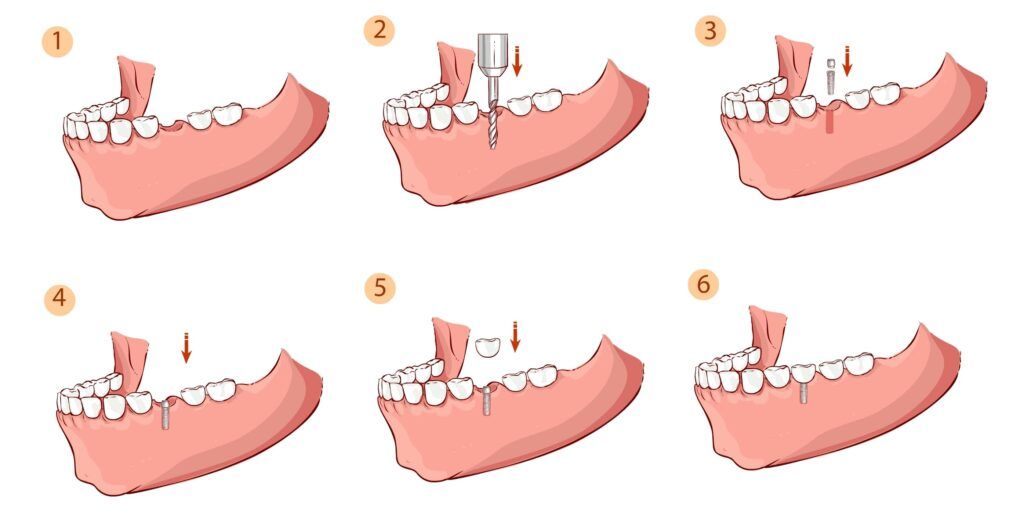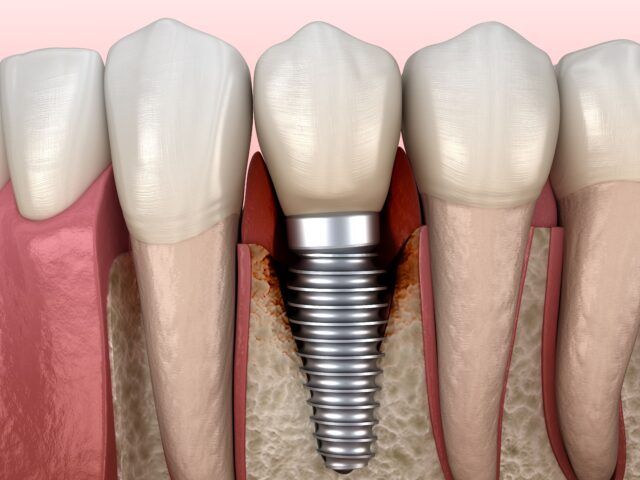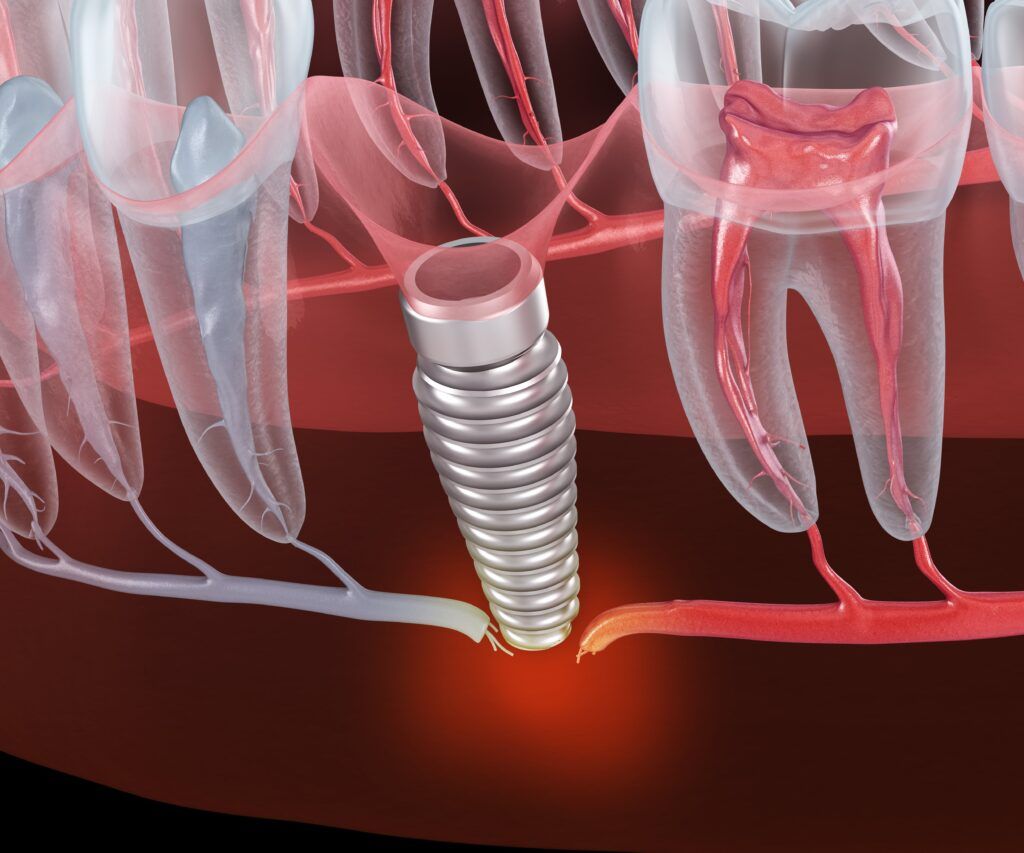Dental implants have become a popular and effective solution for replacing missing teeth. They offer numerous benefits, such as improved appearance, function, and oral health. However, like any medical procedure, dental implant surgery can come with its share of complications and problems. In this blog, we’ll explore some common dental implant problems and discuss how to address them.
Understanding Dental Implants and Placement
Dental implants are artificial tooth roots made of biocompatible materials, most commonly titanium. These implants serve as a sturdy foundation for replacement teeth, such as crowns, bridges, or dentures. They offer a permanent and natural-looking solution for individuals with missing teeth, improving both aesthetics and oral function.
The placement of dental implants is a multi-step procedure that typically involves the following steps:
Step #1 Consultation and Evaluation:
The process begins with a comprehensive consultation with your dentist or oral surgeon. During this initial visit, your dental professional will assess your oral health, including the condition of your gums and jawbone, and discuss your treatment options.
Step#2 Treatment Planning:
Based on the evaluation results, a customized treatment plan is developed. This plan considers factors like the number of missing teeth, the condition of the jawbone, and the type of dental implants and prosthetic teeth needed.
Step #3 Surgical Placement:
The surgical phase of dental implant placement involves the following steps:

- Anesthesia: Local anesthesia is administered to ensure you are comfortable and pain-free throughout the procedure.
- Incision: A small incision is made in the gum tissue to expose the underlying jawbone.
- Drilling: A series of drills are used to create a hole in the jawbone to precisely fit the dental implant.
- Implant Placement: The dental implant, typically shaped like a screw, is carefully inserted into the prepared site.
- Suturing: The incision is then closed with sutures.
Step #4 Healing and Osseointegration:
After implant placement, a crucial process called osseointegration occurs. This involves the jawbone growing and fusing with the implant over several months. Osseointegration is vital for implant stability and long-term success.
Step #5 Abutment Placement:
Once osseointegration is complete, a small connector called an abutment is attached to the implant. This connector serves as a link between the implant and the final prosthetic tooth.
Step #6 Prosthetic Attachment:
After the abutment is in place, your dentist will take impressions of your mouth to create a custom-made crown, bridge, or denture that will be securely attached to the abutment. The prosthetic tooth is designed to match your natural teeth in color, shape, and size.
Step #7 Final Restoration:
The final prosthetic restoration is carefully placed and adjusted for a comfortable and natural fit. Your dentist will ensure that your bite is aligned correctly, allowing for proper chewing and speaking function.
Common Dental Implant Problems
With so many steps involved in placing dental implants, there are opportunities for problems to occur. Although the majority of dental implants are successful, it is important to be familiar with possible problems that can occur so that you can recognize them early on. Early intervention is key in addressing these problems and ensuring dental implant success.
Infection

Dental implant infections, though relatively rare, can pose significant challenges if they occur. These infections typically manifest days after surgery as peri-implantitis, a condition akin to gum disease that affects the tissues surrounding the dental implant. Symptoms may include redness, swelling, pain, and bleeding around the implant site. If left untreated, peri-implantitis can lead to bone loss, jeopardizing the stability of the implant and potentially necessitating its removal. Preventing implant infections requires diligent oral hygiene practices, regular dental check-ups, and adhering to post-operative care instructions provided by your dental professional. If an infection does occur, prompt treatment with antibiotics, professional cleanings, and other interventions may be necessary to mitigate the issue and preserve the integrity of the dental implant.
Solution: To prevent and address infection, your dentist may prescribe antibiotics. Proper oral hygiene is crucial to avoid bacterial buildup. Make sure to follow post-operative care instructions, including rinsing with an antimicrobial mouthwash.
Implant Failure
Dental implant failure can be a distressing issue for individuals who have undergone implant surgery. It occurs when the implant does not successfully integrate with the surrounding jawbone or experiences complications that lead to its removal. Several factors can contribute to implant failure, including inadequate bone density, poor surgical technique, infection, or the presence of systemic health conditions like diabetes. Symptoms of implant failure may include persistent pain, mobility of the implant, or even the implant breaking or falling out.
Solution: If an implant fails, it may need to be removed and replaced after the site has healed. Before undergoing implant surgery, ensure you choose a skilled and experienced dentist or oral surgeon to increase the chances of success. Adequate bone quality and quantity are also vital for implant stability.
Gum Recession
Gum recession around dental implants can be a concerning issue that affects both the appearance and long-term stability of the implant. When the gum tissue around an implant recedes, it can expose the metal or abutment beneath the crown, creating an unnatural and less aesthetically pleasing appearance. Additionally, gum recession can potentially lead to further complications if not addressed promptly, such as increased susceptibility to peri-implantitis, a condition that resembles gum disease and can result in bone loss around the implant.
Solution: To address gum recession, dental professionals may recommend soft tissue grafting procedures, where tissue from another area of the mouth is used to cover the exposed implant surface. Maintaining excellent oral hygiene and following your dentist’s aftercare instructions can help prevent or minimize gum recession around dental implants. Early intervention and regular dental check-ups are essential to ensuring the long-term success and appearance of your dental implant.
Nerve Damage

Nerve damage in relation to dental implants is a rare but potentially distressing complication that can occur during the implant placement process. Typically, the inferior alveolar nerve or the mental nerve, responsible for sensation in the lower jaw, may be affected. Nerve damage can result in symptoms such as numbness, tingling, or pain in the lips, tongue, or chin on the side where the implant was inserted. While most cases of nerve damage are temporary and resolve over time, some instances can lead to long-lasting or permanent sensory changes. Skillful and precise implant placement techniques, careful consideration of nerve location, and thorough pre-operative evaluation can minimize the risk of nerve damage. Patients should discuss the potential risks and benefits with their dental professional before proceeding with implant surgery and report any unusual sensations promptly to ensure appropriate management and monitoring.
Solution: Nerve damage is usually temporary but can sometimes be permanent. In many cases, the symptoms will improve over time. Proper implant placement and careful surgical technique can minimize the risk of nerve damage.
Allergic Reactions
Allergic reactions to dental implants, though exceedingly rare, can occur in some individuals. These reactions are typically associated with hypersensitivity to the materials used in the implant, such as titanium or the alloys present in the implant’s composition. Symptoms of an allergic reaction may include swelling, redness, itching, or discomfort in the implant area. In such cases, it’s crucial to consult with a dentist or oral surgeon promptly to diagnose the issue. If an allergy to the implant materials is confirmed, alternative implant materials or treatment options can be explored to avoid further complications. While allergic reactions to dental implants are uncommon, thorough pre-operative assessments and discussions with your dental professional can help identify any potential risks or sensitivities before the implant procedure.
Solution: If you suspect an allergic reaction, consult your dentist immediately. They can perform tests to determine if you have an allergy and may recommend alternative materials for your implant.
Loose Implants
Loose dental implants can be a concerning issue that requires prompt attention. Implants are designed to be firmly anchored within the jawbone, providing stability for prosthetic teeth and supporting proper function. However, factors such as poor oral hygiene, excessive biting forces, or bone loss can lead to implant mobility. When an implant becomes loose, it may result in discomfort, difficulty chewing, or an unnatural sensation in the mouth.
Solution:Addressing this problem usually involves a thorough evaluation by a dental professional to determine the underlying cause. Depending on the situation, treatment options may include tightening or replacing the implant, bone grafting to improve stability, or adjustments to the prosthetic restoration. It’s crucial for individuals with loose dental implants to seek immediate dental care to prevent further complications and ensure the long-term success of the implant.
Preventing Dental Implant Problems
Preventing dental implant problems is essential to ensure the long-term success and functionality of your dental implants. Here are some key steps to help you minimize the risk of issues:
Choose a Skilled Dental Professional:
Select an experienced and qualified dental implant dentist to perform your implant surgery. Their expertise can significantly influence the success of the procedure.
Comprehensive Evaluation:
Before proceeding with implant surgery, undergo a thorough evaluation of your oral health. This should include assessing the quality and quantity of your jawbone, the condition of your gums, and any potential risk factors.
Good Oral Hygiene:
Maintain excellent oral hygiene habits, including regular brushing, flossing, and rinsing with an antimicrobial mouthwash. Proper hygiene reduces the risk of infection around the implant.
Quit Smoking:
Smoking can increase the risk of implant failure. If you smoke, consider quitting or reducing your smoking habits before and after implant surgery.
Manage Health Conditions:
If you have underlying health conditions like diabetes, work closely with your healthcare provider to manage them effectively, as they can affect the healing process.
Follow Post-Operative Care Instructions:
Adhere to your dentist’s or oral surgeon’s post-operative care instructions meticulously. This includes taking prescribed medications, attending follow-up appointments, and maintaining a soft-food diet during the initial healing phase.
Avoid Excessive Force:
Avoid chewing on hard or sticky foods that can put excessive pressure on the implants. Protect your investment by being mindful of your dietary choices.
Regular Dental Check-Ups:
Attend regular dental check-ups to monitor the health and stability of your dental implants. Your dentist can detect and address any issues early on.
Oral Health Education:
Learn about dental implant care and maintenance. Your dentist can provide guidance on the best practices for keeping your implants in excellent condition.
Wear a Nightguard (if needed):
If you have a habit of grinding your teeth at night (bruxism), consider wearing a nightguard to protect your implants and prevent excessive stress on them.
By taking these proactive measures and maintaining a commitment to your oral health, you can significantly reduce the likelihood of dental implant problems and enjoy the benefits of a lasting and functional tooth replacement solution.
Conclusion
While dental implants are a highly successful and durable solution for tooth replacement, complications can arise. It’s essential to choose a skilled and experienced dental professional, follow post-operative care instructions meticulously, and maintain excellent oral hygiene to minimize the risk of common dental implant problems. If you encounter any issues, don’t hesitate to consult your dentist promptly to ensure your implants continue to provide you with a beautiful and functional smile. Regular dental check-ups and ongoing care are essential for the long-term success of your dental implants.

